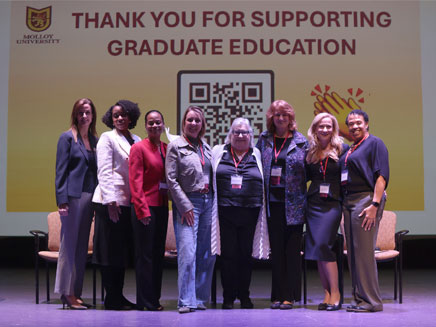October 22, 2025
Highlighting the Importance of Literacy
 The Molloy University School of Education and Human Services recently hosted a conference entitled “Back to the Basics of Literacy: Engaging and Equitable Practices to Bring Joy and Excitement Back into Learning, PreK-20.” Attendees included educators, administrators, leaders, teacher candidates, higher education faculty, and parents/guardians.
The Molloy University School of Education and Human Services recently hosted a conference entitled “Back to the Basics of Literacy: Engaging and Equitable Practices to Bring Joy and Excitement Back into Learning, PreK-20.” Attendees included educators, administrators, leaders, teacher candidates, higher education faculty, and parents/guardians.
The diverse group came together to explore, share, and collaborate on the critical role literacy plays in shaping the future of our students and communities from P-20 and beyond. Attendees learned how to tune in to the basic practices to meet the literacy needs of diverse 21st-century learners.
The keynote address was delivered by Angelique Johnson-Dingle, Deputy Commissioner for P-12 Instructional Support, and it was followed by a panel discussion on research-based, high-impact literacy practices. The panelists were:
- Kerry Leo, Consultant and Founder of Davinci Collaborative
- Dr. LaQuita Outlaw, Assistant Superintendent for Curriculum and Instruction, Bay Shore School District
- Dr. Andrea Honigsfeld, Molloy University TESOL Faculty
- Amy Benjamin, Consultant
- Angelique Johnson-Dingle, Deputy Commisioner for P-12 Instructional Support
“Literacy affects everyone, crosses all disciplines, and is foundational for equity,” said Dr. Vicky Giouroukakis, Chair of the Molloy Literacy Conference, Director of Graduate and Postgraduate Education Programs, Molloy University School of Education and Human Services. “The conference aimed to foster dialogue around literacy and share engaging and equitable practices that bring joy into learning. It was meant to break the silos in which early elementary, elementary, secondary, and higher education faculty and administrators often find themselves and build bridges. By bringing together voices from all levels, we can ensure that the diverse needs of our learners will be met, and that they will be prepared for today's literacy demands and those of the future.”
The conference also included two workshop sessions and a poster session that covered various topics, including:
- The Science of Reading (Phonics, Phonological Awareness, Fluency, Comprehension, Vocabulary, Oral Language)
- Writing
- Speaking and Listening
- Cultural and Linguistic Diversity
- Language-Based Challenges
After the program, participants were able to learn new evidence-based strategies that they could incorporate into their curricula or clinical plans to support the development of language and literacy skills in students.